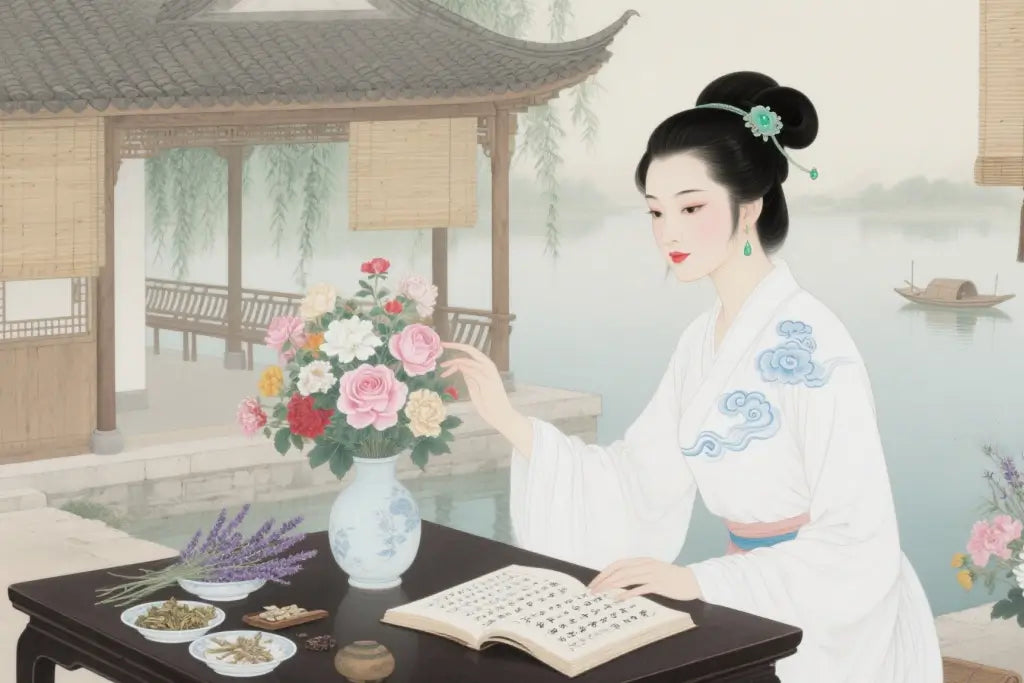
The fragrance of traditional Chinese medicine heals the body and mind.
Aromatherapy with Chinese Herbal Medicines
In traditional Chinese medicine (TCM) theory, aromatherapy, which treats diseases by inhaling the odors of Chinese herbal medicines, has a profound theoretical foundation. In the classic TCM work *Huangdi Neijing* (The Inner Canon of the Yellow Emperor), there is a record stating that "The five odors enter the nose and are stored in the heart and lungs, making the five colors bright and the sounds distinct," clearly expounding the connection between the odors inhaled through the nose and the internal organs of the human body, laying the theoretical foundation for aromatherapy. According to TCM, the meridian system of the human body crisscrosses, connecting the internal organs and external limbs. The aromatic qi of Chinese herbal medicines can enter the human body through the nasal cavity, run along the meridians, stimulate the meridian qi, and regulate the qi and blood, thus achieving the purpose of treating diseases. From the perspective of modern medicine, the olfactory receptors in the nasal cavity are closely connected to the limbic system and the autonomic nervous system of the brain. When people inhale the odors of Chinese herbal medicines, the molecules of the aromatic substances stimulate the olfactory nerves, and the nerve impulses are transmitted to the brain, affecting the secretion of neurotransmitters and regulating the physiological and psychological functions of the human body, such as regulating the endocrine system and improving immune function.
In practical applications, aromatherapy has relatively significant effects on the treatment and alleviation of many diseases and conditions, as follows
Cold : Some Chinese herbal medicines with the functions of relieving exterior symptoms with pungent and warm properties or clearing heat and detoxifying, such as mint, perilla, and honeysuckle, have volatile odors that can stimulate the respiratory mucosa, promote blood circulation, enhance the resistance of the respiratory tract, and relieve symptoms such as nasal congestion, runny nose, and headache caused by a cold. For example, chop mint, perilla, and other medicinal herbs, put them in a cloth bag, and place it beside the pillow or in the room. Let the patient inhale the odor, which can help relieve cold symptoms and promote physical recovery.
Insomnia : Chinese herbal medicines with the functions of calming the nerves and aiding sleep, such as lavender, Albizia flower, and Polygala tenuifolia, have fragrances that can soothe the nerves, relax the body and mind, regulate the body's biological clock, and help improve the quality of sleep. You can make sachets with these Chinese herbal medicines and place them beside the bed, or use incenses containing these herbal ingredients to fumigate the bedroom before going to bed to create an atmosphere conducive to sleep.
Headache : For headaches caused by factors such as poor qi and blood circulation, invasion of wind, cold, and dampness, or hyperactivity of liver yang, the odors of certain Chinese herbal medicines can dredge the meridians, regulate qi and blood, dispel wind and cold. For example, Chinese herbal medicines like Angelica dahurica and Ligusticum chuanxiong have the effect of promoting qi circulation and relieving pain. Grind them into powder, put it in a sachet, carry it with you or place it near the head, and inhale the odor, which can relieve headache symptoms.
Weak Spleen and Stomach : Some Chinese herbal medicines with the functions of strengthening the spleen and regulating the stomach, such as Amomum villosum, Agastache rugosa, and Tangerine peel, have fragrances that can stimulate the olfactory receptors, reflexively enhance gastrointestinal peristalsis, increase the secretion of digestive juices, and thus improve the functions of the spleen and stomach and enhance appetite. You can make these Chinese herbal medicines into fragrant pills or sachets, keep them nearby, or inhale the odor before meals, which is helpful in improving problems such as loss of appetite and indigestion caused by a weak spleen and stomach.
Compared with oral or topical medications, the treatment method of inhaling the odors of Chinese herbal medicines avoids the direct stimulation of the gastrointestinal tract, liver, and other organs by the medications, reducing the risk of side effects. It is especially suitable for children, the elderly, and those with a weak constitution, playing an important role in preventive healthcare and the conditioning of chronic diseases. It is a characteristic and valuable treatment method in the treasure trove of traditional Chinese medicine.



